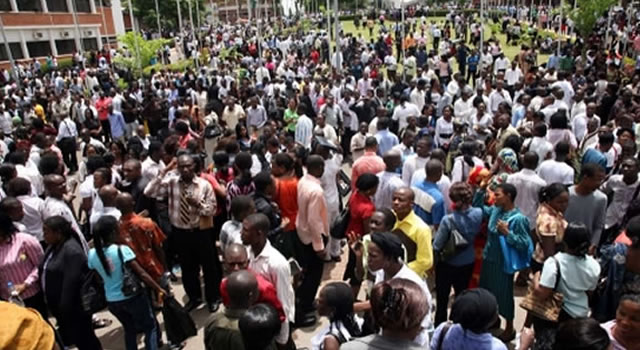Business
18m Nigerians to become jobless by 2022 – FSDH

About 18 million Nigerians have been estimated to become unemployed in the next four years, analysts at FSDH Research have forecasted.
In December 2017, the National Bureau of Statistics (NBS), in its Labour Force Statistics, said out of the 85.1 million labour force population in the country in Q3 2017, 15.9 million people were unemployed while 18 million people were underemployed.
Data from NBS also revealed that Nigeria’s unemployment rate, which has been rising steadily in the last three years, hit 18.8 percent in the third quarter of 2017 from 16.2 percent recorded in the preceding quarter.
The analysts, in FSDH Research’s weekly report released on Monday, said if the unemployment trend continues in the country, then about 18 million Nigerians, representing 13.2 percent increase when compared with Q3 2017 figure, would be jobless by 2022.
A high unemployment rate has both economic and social implications, including high poverty levels, dependency ratio, crime rate and social unrest.
FSDH Research believes that the problem could be addressed with a combination of coordinated policies.
Meanwhile, it is also estimated that Nigeria’s population might grow to 235 million in 2022 from 194 million estimate in 2016.
Read also: Osinbajo explains why Nigeria has high poverty index
This represents an average growth rate of 3.31 percent between 2016 and 2022.
The analysts, however, said it is not certain if the large population would be beneficial to the Nigerian economy, but noted that the country could unlock huge benefits inherent in her large population with appropriate policy implementation including investment in quality education, healthcare services and establishment of technical centres for skills acquisition.
“Usually, a large population offers a large market size, with immense benefits for economic and commercial activities provided there is a strong purchasing power among the citizenry.
“Education, healthcare, real estate, consumer goods, financial services, information and communication, power and energy are among the sectors that should benefit from the large population.
“However, it appears that this is not the case in Nigeria because of several social and economic hindrances in the country,” the analysts said.
They urged policy makers and economic managers to create an enabling business environment that would attract investments – both local and foreign – and foster business expansion in order to create jobs.
By Oluwasegun Olakoyenikan….
RipplesNigeria… without borders, without fears
Click here to join the Ripples Nigeria WhatsApp group for latest updates.
Join the conversation
Support Ripples Nigeria, hold up solutions journalism
Balanced, fearless journalism driven by data comes at huge financial costs.
As a media platform, we hold leadership accountable and will not trade the right to press freedom and free speech for a piece of cake.
If you like what we do, and are ready to uphold solutions journalism, kindly donate to the Ripples Nigeria cause.
Your support would help to ensure that citizens and institutions continue to have free access to credible and reliable information for societal development.






















